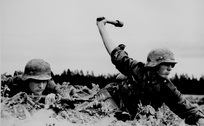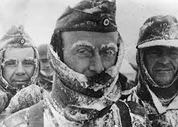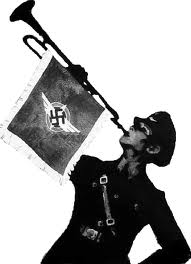Summary of the conflict
In the early 1930's, fascist regimes began their rise to power around the world. Adolf Hitler promised to rebuild a Germany that was left in shambles after the Great War. Mussolini did the same for Italy, and Japan followed suit. After Hitler gathered a huge following, he began to seek political power. He was named chancellor of Germany in 1932 in a manipulated yet democratic vote. Soon after, he launched a political campaign against the huge population of Jewish people living in his country. He blamed them for Germany's ruin after the Treaty of Versailles, the treaty that ended WWI. After he had established complete control of the nation, he announced that Germany needed more room for the population they supported and launched an offensive against Poland to gain new territory. He quickly increased his offensive throughout Europe and Britain was forced to declare war and allied its self with Russia and China. Japan and Italy joined on the German side, which gave Hitler his path to the Pacific. With Japan slowly taking over in the Pacific and the Nazi's advancing in Europe, the Allied nations grew worried. They begged the United States to join on the Allied side, but the US still had strong isolationist attitudes left over from the first Great War. So instead the war was brought to their doorstep. Japan bombed Pear Harbor, Hawaii, on December 7th, 1941, three years after the beginning of the conflict. The Americans were forced into the war, and quickly turned the tides by flooding troops into both the European and Pacific theaters. Soon the German's were pushed back to Berlin, their capitol, and were forced to surrender. Japan refused the unconditional surrender that the Allies demanded and to avoid more loss of American lives, the United States dropped two atom bombs on Japan, completely destroying any hope the Japanese had for continuing the fight. The aftermath of these bombs was devastating, killed millions and threw the world into a new form of war.
Driving questions
- What is war's effect on the individual?
- What is war's effect on society?
- What is the cost of war?
- Can war, with all its destruction, be beneficial?
Catch-22
"There was only one catch and that was Catch-22..." (Heller 46)
See the movie pilot now!
photo/video galleryTo see more |
Foreign policy"We must be the great arsenal of democracy." (President Roosevelt)
To learn about the US' foreign policy at the time
WAR SONGSTo see analysis and listen to songs written about and during WWII
|



